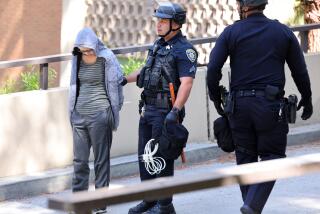L.A. council says pot shops could accept cash
Dispensaries in Los Angeles could continue to accept cash for medical marijuana under a provision approved by the City Council on Tuesday, after it adopted language carefully crafted to maneuver past the city attorney’s adamant position that state law bars the sale of the drug.
Plowing through more than 50 proposed changes to its draft medical marijuana ordinance, the council also signaled that it would probably cap the total number of dispensaries at between 70 and 200. The council asked city officials to return next Wednesday with studies on caps and on restrictions that would keep dispensaries either 500 feet or 1,000 feet from places such as schools and parks. The council also added new restrictions on dispensaries and rejected efforts to loosen requirements.
By the close of the daylong session, the council had made substantial headway on an issue that has bedeviled it for years.
With a judge’s recent ruling that the city’s moratorium on dispensaries was invalid, the city has almost no control over the hundreds that have opened.
The council, which avoided the word “sales” on the advice of its lawyers, decided that Los Angeles would allow “cash contributions, reimbursements and compensations” as long as they comply with state law.
Council President Eric Garcetti stepped in to negotiate the provision after an extended discussion. “We have some very elegant and flexible language that will adjust as state law is defined,” he said.
City Atty. Carmen Trutanich and Los Angeles County Dist. Atty. Steve Cooley had urged the council to explicitly ban the sale of marijuana.
William Carter, the chief deputy city attorney, said his office was following state law and recent court decisions, which led to the conclusion that collectives could only cultivate marijuana, not sell it. “Until they change the law, what we’re stuck with is this collective model, not the drive-through Starbucks model,” he said.
Several members harshly criticized the city attorney’s office. Councilman Ed Reyes, who oversaw the effort to write an ordinance, accused the office of pressing “a political point of view that has nothing to do with objective advice,” while Councilman Paul Koretz, who helped write the state law as an assemblyman, said: “I think we’re getting advice from one direction.”
Council members expressed a clear interest in caps, most likely distributed among the city’s 21 police divisions.
The council, though, remains unsure whether to give preference to the 186 dispensaries that registered with the city when the moratorium was adopted in 2007. Councilman Richard Alarcon said he saw nothing “magic” in the number, while Councilwoman Janice Hahn said it would be “fair and reasonable” to favor those who had followed the law.
The council rejected an amendment from Koretz and Reyes that would have required the police to get a court order to review the records kept by dispensaries.
Councilman Jose Huizar and several other members objected vociferously to the proposal, saying that they feared it would undermine efforts to try to cull bad dispensaries.
The city attorney’s office and the Police Department, noting that other cities have similar requirements, argued that ready access to the records was essential to determine whether the collectives were following the law. “An inspection is problematic if you create too many limits on it,” LAPD Cmdr. Pat Gannon said.
The council asked city officials to draft language to ensure that police have no access to patient medical records. The council also had a heated discussion about whether to eliminate the ordinance’s requirement that collectives possess no more than five pounds of marijuana and grow it on-site.
Huizar argued against the change. “We are encouraging a black market,” he said. “This is a dangerous path.”
Exasperated, Reyes shot back that the current restriction would not work. “I’m not advocating for the black market, gangs, cartels to take advantage of this,” he said, “But we can’t choke it to the point where it does not function.”
Reyes then withdrew his amendment and asked Huizar to come up with an alternative.
The council also approved an amendment to limit operators to one dispensary and an amendment to limit patients and caregivers to membership in one collective, but allow for emergency purchases.
The restriction on membership drew protests from medical marijuana advocates. “If you go to your favorite dispensary, and they’re out of what you need, you have to go someplace else,” said Degé Coutee, the head of a patient group.
The council readily adopted a series of amendments, most of them offered by Koretz and borrowed from West Hollywood, that added more protections for neighborhoods. Dispensaries would be required to have unarmed security guards who would patrol a two-block area, to provide a contact name to police and residents who live within 500 feet, and to deposit cash once a day.
The council also called on the state attorney general to clear up the confusion over whether state law allows the sale of marijuana. Atty. Gen. Jerry Brown issued guidelines on medical marijuana last year, but several court decisions since then have raised questions about his conclusion that properly operated nonprofit dispensaries may be legal.
Brown’s interpretation came up several times as the city attorney’s office, council members and some speakers cited a local radio announcer’s report that the attorney general had said all sales were illegal. A spokesman for Brown said the report was inaccurate and Brown has not changed his position.
The council also tangled over an amendment to put a $100,000 cap on salaries at dispensaries. It was offered by Alarcon, who said the dispensary downstairs from his office was making $12,000 a day.
“That’s a lot of money,” he said. “That’s too much money.”
The council decided to try to find another way to limit salaries, such as applying standards set by United Way.
More to Read
Start your day right
Sign up for Essential California for news, features and recommendations from the L.A. Times and beyond in your inbox six days a week.
You may occasionally receive promotional content from the Los Angeles Times.






